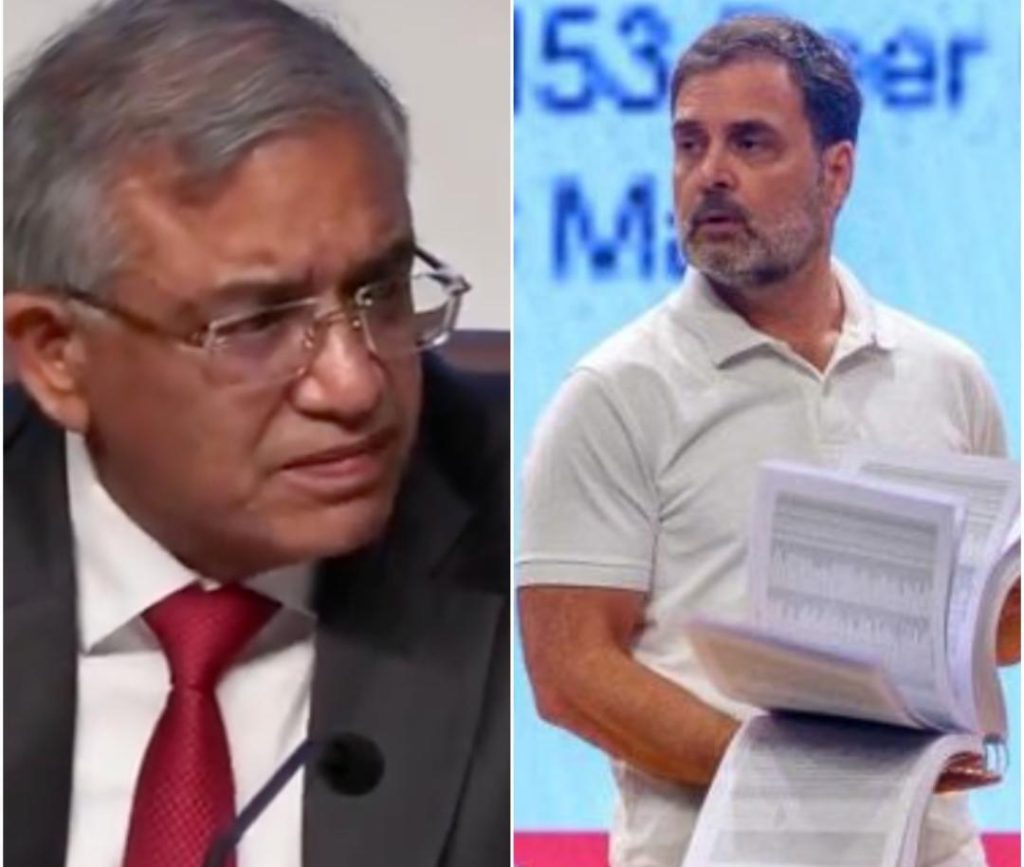
Vote Chori’ Phrase an Insult; Should We Share CCTV Footage of Mothers & Sisters Voting?: EC
In the midst of the ongoing election season in India, a heated debate has emerged regarding the authenticity of the voting process. The Election Commission of India (EC) has recently taken on the task of addressing the concerns surrounding the integrity of the electoral system. In a recent statement, the Chief Election Commissioner (CEC), Gyanesh Kumar, strongly criticized the use of the phrase “vote chori” (vote theft) by Congress leader Rahul Gandhi, calling it an insult to the Constitution.
The phrase “vote chori” has been used by Gandhi to imply that the elections are being rigged in favor of the ruling party. This has sparked a heated debate, with many politicians and citizens questioning the legitimacy of the voting process. In response to these claims, the EC has emphasized the need to maintain the sanctity of the electoral system, ensuring that every vote is cast freely and fairly.
One of the key concerns raised by the EC is the demand for releasing surveillance footage from polling booths. On this issue, the CEC has taken a strong stance, asking whether the EC should share CCTV videos of any voter, including their mothers, daughters-in-law, and other family members. This question highlights the sensitive nature of privacy concerns in the context of surveillance and the need for a careful balance between transparency and privacy.
The EC’s concerns are rooted in the fact that CCTV footage can be highly intrusive and potentially privacy-invasive. The footage can capture intimate moments of voters, including their family members, which can be highly embarrassing and damaging to their reputation. Moreover, releasing such footage can create a culture of surveillance, where voters may feel pressured to vote in a certain way or risk being caught on camera.
In addition to privacy concerns, the EC has also emphasized the need to maintain the integrity of the electoral system. The Commission has taken steps to ensure that the voting process is secure and free from manipulation. This includes measures such as the use of electronic voting machines (EVMs), voter verification, and the deployment of security personnel at polling stations.
Despite the EC’s efforts, the debate surrounding the legitimacy of the voting process continues to rage on. The use of the phrase “vote chori” by Gandhi has been criticized by many, including the EC, as an attempt to undermine the democratic process. The EC has emphasized the need for politicians to refrain from making inflammatory statements that can create doubts about the integrity of the electoral system.
The controversy surrounding the “vote chori” phrase has also raised questions about the role of social media in shaping public opinion. The EC has warned against the spread of misinformation and false narratives on social media, which can create confusion and mistrust among voters.
In conclusion, the debate surrounding the “vote chori” phrase and the demand for releasing CCTV footage from polling booths highlights the sensitive nature of privacy concerns and the need for a careful balance between transparency and privacy. The EC’s stance on this issue is critical in maintaining the integrity of the electoral system and ensuring that every vote is cast freely and fairly.
In a country where democracy is the foundation of governance, it is essential to maintain the sanctity of the electoral process. The EC’s efforts to ensure transparency and accountability are crucial in building trust among voters and ensuring that the democratic process is free from manipulation.
Sources:






